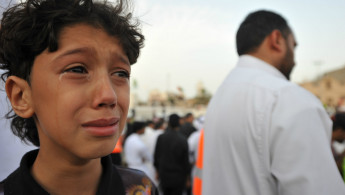Last house in restive Shia town demolished: Saudi authorities
Municipal spokesman Mohammed al-Sufyan said that 488 homes were demolished in the historic area of al-Mosawara, in the town of Awamiya in Saudi Arabia's Eastern Province. The town is populated by minority Shias.
The Saudi government says armed Shia men used al- Mosawara's narrow streets as cover, adding that old buildings were not safe for residents.
The demolitions, which began in mid-May, have sparked shoot-outs in the streets between Saudi security forces and Shia gunmen in which at least two dozen people were killed – mostly locals.
In April, UN experts on cultural rights demanded the Saudi government to immediately halt demolition plans of the historic neighbourhood, warning that the demolitions will result in the forced evictions of thousands of residents there.
They said in a statement the Saudi government has ignored concerns and its only response "has been these violent actions".
The old district is known as al-Mosawara, Arabic for the "walled fortress", named for its 400-year-old walls that protected the area from raiders.
"[The] demolition would erase this unique regional heritage in an irreversible manner," the UN Special Rapporteur on poverty, cultural rights and housing Karima Bennoune said.
Flashpoint of tensions
Awamiya, a town of 25,000-30,000 residents, has long been a flashpoint of tensions with the kingdom's Shias, who complain of discrimination at the hands of Saudi Arabia's ultra-conservative Sunni clerics.
Though the Eastern Province sits atop most of Saudi Arabia's oil reserves, al-Awamiya lacks basic services like a functioning hospital. It has no major ports. Garbage sits uncollected for weeks on the streets.
In 2011, prominent Shia cleric Nimr al-Nimr rallied thousands there during Arab Spring protests, linking their movement for social justice and greater rights with the Shia-led sit-ins in nearby Bahrain.
Nimr was executed last year for his role in the protests. His execution sparked backlash in Iran that led to the ransacking of the Saudi Embassy and a complete severing of ties between the two countries.
The immediate response in his hometown of Awamiya, however, was more muted - the result of years of police crackdowns and arrests.
At least 51 people - 30 of them from Awamiya - have been killed in related violence in the Eastern Province between March 2011 and 1 June of this year.





 Follow the Middle East's top stories in English at The New Arab on Google News
Follow the Middle East's top stories in English at The New Arab on Google News
![Both Hamas and the Palestinian Authority welcomed the ICC arrest warrants [Getty]](/sites/default/files/styles/image_330x185/public/2024-11/GettyImages-2178351173.jpg?h=199d8c1f&itok=TV858iVg)

